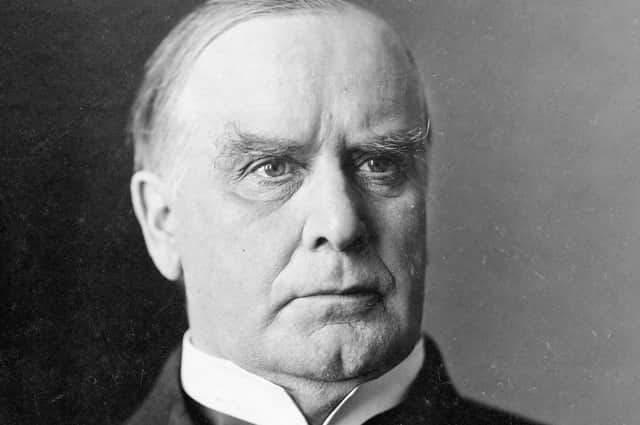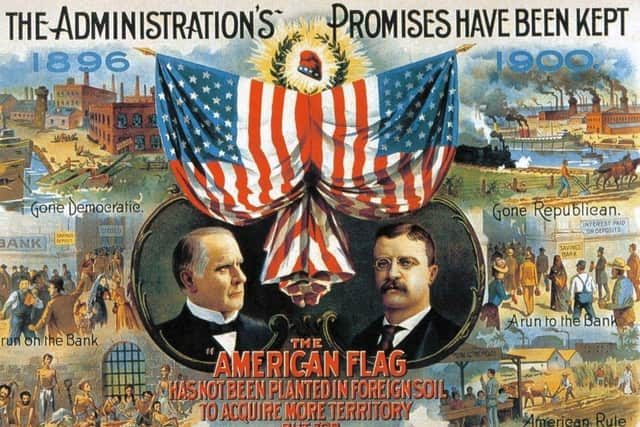William McKinley, US president of Co Antrim stock, laid foundations for era of Republican dominance


In the mid-1740s a James McKinley emigrated from Conagher, Co Antrim. A century later, in 1843, William McKinley, his great-great-grandson, was born in Niles, Ohio. Between 1892 and 1896 William McKinley was governor of Ohio, a prelude to becoming the 25th president of the United States.
Before the outbreak of the American Civil War McKinley was a schoolteacher. He enlisted as a private in the Union Army. Twice promoted by Rutherford Hayes, his commanding officer, including once for an act of bravery at Antietam, McKinley had a good war, ending the conflict as a brevet major. After the war he studied law, became an attorney in Canton, Ohio, and married Ida Saxton, daughter of a local banker.
Advertisement
Hide AdAdvertisement
Hide AdMcKinley became politically active through campaigning for Rutherford Hayes, his old commander, when the 19th president of the United States was running for governorship of Ohio. At the age of 34 McKinley was elected to Congress as a Republican. During his 14 years as a Congressman, McKinley became well known for his advocacy of high tariffs. He was elected governor of Ohio in 1891 and was re-elected in 1893.


As a result of a campaign conducted with great skill by Marcus (Mark) Alonzo Hanna, a wealthy Cleveland businessman, McKinley secured the Republican presidential nomination in 1896. Hanna marketed McKinley as ‘the advance agent of prosperity’. In the presidential election McKinley had little difficulty in defeating William Jennings Bryan, the 36-year-old lawyer from Nebraska who was the Democratic nominee, in an election largely fought over tariffs and fiscal policy, McKinley’s area of expertise. Nevertheless Paul F Boller Jnr, the historian of presidential campaigns, has described the 1896 campaign as ‘the liveliest since the Civil War’.
McKinley’s presidency is of interest for several reasons. First, his administration introduced the highest tariffs in American history. Secondly, he presided over a period of economic expansion. Admittedly, he was fortunate in that when he became president the depression which had begun in 1893 had virtually run its course. Thirdly, he presided over a period of territorial expansion. In July 1898 Hawaii was annexed. As a result of the Spanish-American War, the United States also acquired the Philippines, Puerto Rico and Guam.
A fourth feature of McKinley’s presidency is the extent to which he laid the foundations of success for his party over an extended period. In the presidential contest of 1896, the Republicans were able to outspend the Democrats by 10 to one. McKinley won by a landslide, establishing the Republicans as the dominant party for a generation. Except for the presidency of Woodrow Wilson (1913-21), Republicans monopolised the White House and dominated the Congress between 1896 and 1932.
Advertisement
Hide AdAdvertisement
Hide AdThe Spanish-American War demonstrates the growing importance of public opinion in American politics. In January 1898 the US government sent the USS Maine to protect American interests during the long-standing revolt of the Cubans against the Spanish government. On the evening of February 15 1898, the Maine sank when her forward gunpowder magazines exploded, resulting in the deaths of 260 American sailors and marines.
The explosion was probably the result of an accident but American public opinion assumed (without waiting for any evidence) that the Spanish had blown up the ship. McKinley was no warmonger: ‘I shall not get into a war until I am sure that God and man approve. I have been through one war; I have seen the dead pile up; and I do not want to see another.’
The clamour for war in a year of mid-term elections ultimately proved irresistible. In the resulting 100-day war, the United States destroyed the Spanish fleet outside Santiago harbour in Cuba, seized Manila in the Philippines, and occupied Puerto Rico.
McKinley’s second term began auspiciously but came to a tragic end in September 1901.On September 6 President McKinley was standing in a receiving line at the Pan-American Exposition at Buffalo, New York, when Leon Czolgosz, a second-generation Polish anarchist, shot him twice. One bullet was easily found and extracted but doctors were unable to locate the second bullet. Fearing that the search for the bullet might cause more harm than good, doctors decided to leave the bullet where it was. Initially McKinley appeared to be recovering from his wounds, but took a turn for the worse six days after the shooting and died on September 14 1901. His last words were: ‘It is God’s way; His will be done, not ours.’
Advertisement
Hide AdAdvertisement
Hide AdMcKinley was succeeded in office by his vice president, Theodore Roosevelt.
McKinley’s character invites genuine admiration. In June 1876, 33 striking miners in the employ of the industrialist Mark Hanna, the man who subsequently secured the Republican nomination for McKinley in 1896, were imprisoned for rioting when Hanna brought in strike-breakers to do the work. McKinley chose to defend the miners in court, and was able to get all but one of them set free. When the miners came to McKinley to pay their legal fees, he refused to accept their money, which they had barely been able to scrape together.
In 1895 a community of seriously impoverished miners in Hocking Valley telegraphed Governor McKinley to report their plight, writing: ‘Immediate relief needed’. Within five hours, McKinley had paid, out of his own pocket, for a railroad car full of food and other supplies to be sent to the miners. He then proceeded to contact the chambers of commerce in every major city in the state, instructing them to investigate the number of citizens living below poverty level. When reports returned revealing large numbers of starving Ohioans, the governor headed a charity drive and raised enough money to feed, clothe, and supply more than 10,000 people.
McKinley’s concern for his assassin is also striking. Having fired two shots, Czolgosz would have fired again but was prevented from doing so by a bystander and then subdued by an enraged crowd. The wounded McKinley called out ‘Boys! Don’t let them hurt him!’